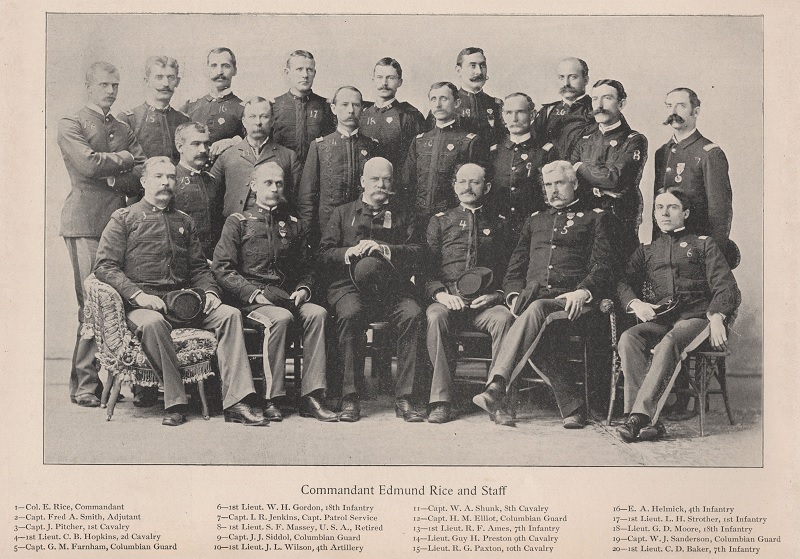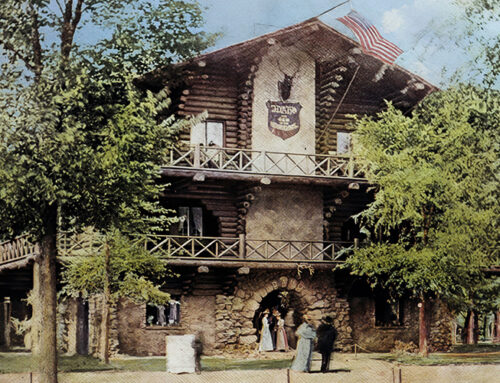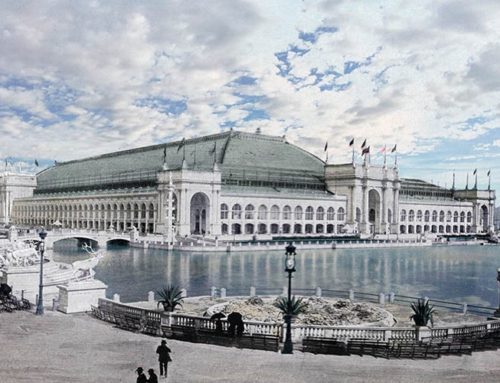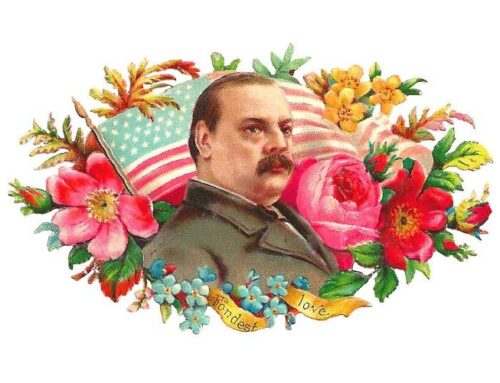Colonel Edmund Rice served as commander of the Columbian Guard, the security and safety force that performed policing and fire-patrol duty inside the grounds of the 1893 World’s Fair in Chicago.
Erik Larson notes in The Devil in the White City (p. 138) that “unlike conventional police departments, the Guard’s mandate explicitly emphasized the novel idea of preventing crime rather than merely arresting wrongdoers after the fact.”
Just prior to taking command of the Columbian Guard in May of 1892, Rice had been awarded the Medal of Honor on October 6, 1891. After the Fair, he served for another decade in the Army, retiring on August 14, 1903, with the rank of Brigadier General. He died in Boston on July 20, 1906, at the age of 63 and is buried in Arlington National Cemetery.
The article below, from the May 14, 1892, issue of the Chicago Daily Tribune, describes the Columbian Guard and their leader, Colonel Rice.
MEN WHO WILL GUARD THE FAIR
How the Columbian Guard Will Be Constituted
When visitors enter the World’s Fair grounds next year they will find the Columbian Guard of 1,500 men to protect them in their wanderings about the grounds and buildings. The guards will not have the appearance of the policemen who travel beats in the City of Chicago, but each will be clothed in a natty uniform of blue, consisting of a braided blouse and trousers, with bright red stripes. They will wear a fatigue cap modeled after an Austrian design, and carry mahogany mace and a short bayonet sword.
These men will be under the direction of Col. Edmund Rice, U.S.A. Col. Rice will be the commander of the guard and have general police supervision over the grounds during the period of the Fair. In order to secure his services a special act of Congress was necessary, and it was passed, for the Colonel belongs to the Department of the Missouri, with headquarters at Chicago, where he has been under Gen. Miles as Acting Judge-Advocate.
Col. Rice is a hero of more than a score of battles in which he participated in the late war, and as a consequence of which he received a number of wounds. He entered the service at the age of 19 as Captain of the Fourteenth Massachusetts. In 1862 he was promoted to Major, and at the battle of Gettysburg was twice wounded in the repulse of Pickett’s charge. On that occasion he plunged forward with his command, and is credited with being chiefly instrumental in repelling Pickett’s assault. In reward for this service he was last year given a medal of Congress, the inscription of which reads “The Congress to Lieut.-Col. Edmund Rice, Nineteenth Massachusetts Volunteers, for conspicuous bravery on the third day of the battle of Gettysburg.”
No sooner had the Colonel taken hold of the work several weeks ago than he discharged a number of men whom he found loitering on their routes and generally inattentive to rules. He wasn’t long in straightening out the 200 men whom he has under his direction at present and establishing a system of discipline that causes every man to “toe the mark.”
The Columbian Guards will be a fine body of men. No one can enter the service whose age is more than 35 years. The applicant must be intelligent and active. He must be courteous as well as muscular and capable of giving information concerning the grounds and buildings to all inquirers.

Commander Edmund Rice and his Staff of the Columbian Guard. Rice is shown in the front row, third from the left. [Image from Pictorial Album and History of the World’s Fair and Midway (Harry T. Smith & Co, 1893).]






Leave A Comment